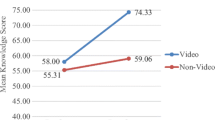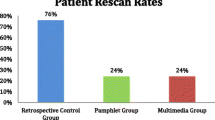Abstract
When preparing the evaluation of a newly designed multimedia tool for supporting preoperative education before radical prostatectomy, we realized that the standard procedure has rarely been investigated. Therefore, we performed semi-structured interviews with 30 consecutive patients the day before and 15 days after radical prostatectomy. Patients’ opinion about their preoperative education is decidedly positive and demonstrates intense patient–physician interaction. All patients wanted to be informed about the procedure and possible risks. None reported to be dissatisfied. All but one of the patients (29/30) was able to ask every single question (6.5 mean). Except for signs of forgetting and a slightly altered retrospective assessment of anxiety, we have found no relevant changes over time. Preoperative education is very important to our patients. Therefore, good communication skills should be developed during medical education. A systematic patient-centered approach could further improve the quality of care.
Similar content being viewed by others
Abbreviations
- STAI:
-
State-trait anxiety inventory
References
Leclercq WKG, Keulers BJ, Scheltinga MRM et al (2010) A review of surgical informed consent: past, present, and future. A quest to help patients make better decisions. World J Surg 34:1406–1415
Issa MM, Setzer E, Charaf C et al (2006) Informed versus uninformed consent for prostate surgery: the value of electronic consents. J Urol 176:694–699
Akkad A, Jackson C, Kenyon S et al (2006) Patients’ perceptions of written consent: questionnaire study. BMJ 333:528
Singer S, Götze H, Möbius C et al (2009) Quality of care and emotional support from the inpatient cancer patient’s perspective. Langenbecks Arch Surg 394:723–731
Gyomber D, Lawrentschuk N, Wong P et al (2010) Improving informed consent for patients undergoing radical prostatectomy using multimedia techniques: a prospective randomized crossover study. BJU Int 106:1152–1156
Masood J, Hafeez A, Wiseman O et al (2007) Informed consent: are we deluding ourselves? A randomized controlled study. BJU Int 99:4–5
Evrard S, Mathoulin-Pelissier S, Larrue C et al (2005) Evaluation of a preoperative multimedia information program in surgical oncology. Eur J Surg Oncol 31:106–110
Huber J, Ihrig A, Yass M, et al. (2011) Improving the preoperative consultation before radical prostatectomy using multimedia support: a randomized controlled trial. Urology 78:S314
Gray RE, Fitch MI, Phillips C et al (1999) Presurgery experiences of prostate cancer patients and their spouses. Cancer Pract 7:130–135
Fagermoen MS, Hamilton G (2003) Preparing patients for urological surgery. Int J Nurs Stud 40:281–290
Burt J, Caelli K, Moore K et al (2005) Radical prostatectomy: men’s experiences and postoperative needs. J Clin Nurs 14:883–890
Dindo D, Demartines N, Clavien P (2004) Classification of surgical complications: a new proposal with evaluation in a cohort of 6336 patients and results of a survey. Ann Surg 240:205–213
Laux L, Glanzmann P, Schaffner P, et al. (1981) [The State-Trait Anxiety Inventory: theoretical foundations and manual.] Beltz Test GmbH, Weinheim
Rasch D, Guiard V (2004) The robustness of parametric statistical methods. Psychol Sci 2:175–208
Keulers BJ, Scheltinga MRM, Houterman S et al (2008) Surgeons underestimate their patients’ desire for preoperative information. World J Surg 32:964–970
Ghulam AT, Kessler M, Bachmann LM et al (2006) Patients’ satisfaction with the preoperative informed consent procedure: a multicenter questionnaire survey in Switzerland. Mayo Clin Proc 81:307–312
Moore KN, Estey A (1999) The early post-operative concerns of men after radical prostatectomy. J Adv Nurs 29:1121–1129
Berry MG, Unwin J, Ross GL et al (2007) A comparison of the views of patients and medical staff in relation to the process of informed consent. Ann R Coll Surg Engl 89:368–373
Wilhelm D, Gillen S, Wirnhier H et al (2009) Extended preoperative patient education using a multimedia DVD-impact on patients receiving a laparoscopic cholecystectomy: a randomised controlled trial. Langenbecks Arch Surg 394:227–233
Luck A, Pearson S, Maddern G et al (1999) Effects of video information on precolonoscopy anxiety and knowledge: a randomised trial. Lancet 354:2032–2035
Wildschut T, Sedikides C, Arndt J et al (2006) Nostalgia: content, triggers, functions. J Pers Soc Psychol 91:975–993
Nuttall M, Wilby D, Chappell B et al (2009) What would truly patient-centered urological care look like? BJU Int 104:287–288
Malle BF, Knobe JM, Nelson SE (2007) Actor-observer asymmetries in explanations of behavior: new answers to an old question. J Pers Soc Psychol 93:491–514
Feldman-Stewart D, Brundage MD, Hayter C et al (2000) What questions do patients with curable prostate cancer want answered? Med Decis Mak 20:7–19
Schroeck FR, Krupski TL, Sun L et al (2008) Satisfaction and regret after open retropubic or robot-assisted laparoscopic radical prostatectomy. Eur Urol 54:785–793
Acknowledgments
We thank the German Academic Exchange Service for providing Beryl Konyango with a scholarship for this project.
Conflict of Interest
The authors declare no conflicts of interest, real or perceived, financial or nonfinancial.
Author information
Authors and Affiliations
Corresponding author
Rights and permissions
About this article
Cite this article
Huber, J., Ihrig, A., Herzog, W. et al. Patients’ View of Their Preoperative Education for Radical Prostatectomy: Does It Change After Surgery?. J Canc Educ 27, 377–382 (2012). https://doi.org/10.1007/s13187-011-0293-0
Published:
Issue Date:
DOI: https://doi.org/10.1007/s13187-011-0293-0




